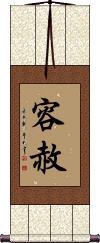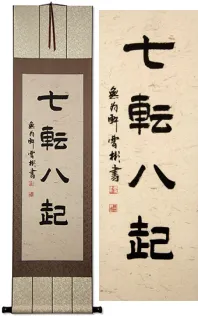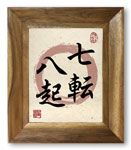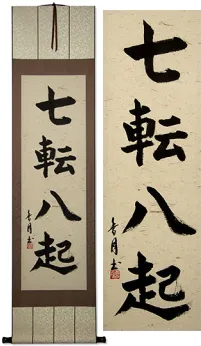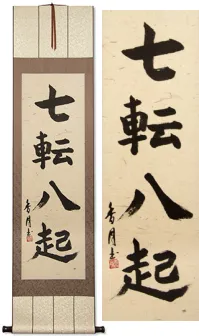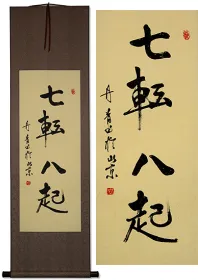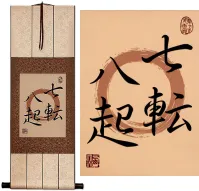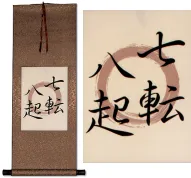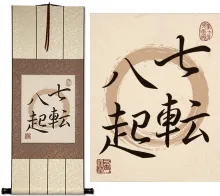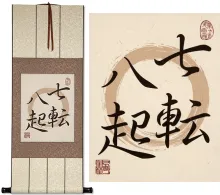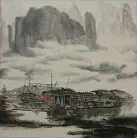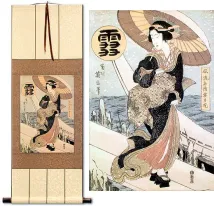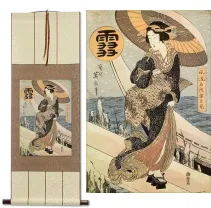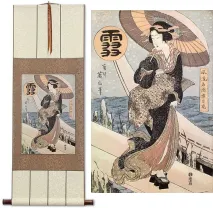Many custom options...
And formats...

The name Down in Chinese / Japanese...
Buy a Down calligraphy wall scroll here!
Personalize your custom “Down” project by clicking the button next to your favorite “Down” title below...
Switched to secondary search mode due to lack of results using primary.
These secondary results may not be very accurate. Try a different but similar meaning word or phrase for better results. Or...
Look up Down in my Japanese Kanji & Chinese Character Dictionary(My dictionary is a different system then the calligraphy search you just tried)
If you want a special phrase, word, title, name, or proverb, feel free to contact me, and I will translate your custom calligraphy idea for you.
Fall Down Seven Times, Get Up Eight
Always rising after a fall or repeated failures
七転八起 is a Japanese proverb that relays the vicissitudes of life, with the meaning “seven times down eight times up.”
Some would more naturally translate it into English as “Always rising after a fall or repeated failures” or compare it to the English, “If at first, you don't succeed, try, try again.”
The first Kanji is literally “7.” The second means “fall down” (sometimes this Kanji means “turn around,” “revolve” or “turn over” but in this case, it holds the meaning of “fall”). The third is “8.” And the last is “get up,” “rouse,” or “rise.”
Basically, if you fail 7 times, you should recover from those events and be prepared to rise an 8th time. This also applies if it is the world or circumstances that knock you down seven times...
...just remember that you have the ability to bounce back from any kind of adversity.
Note: This can be pronounced in two ways. One is “shichi ten hakki” or “shichitenhakki.” The other is “nana korobi ya oki” also written, “nanakorobi-yaoki.”
Special Note: The second character is a Kanji that is not used in China. Therefore, please select a Japanese calligrapher for this title.
Rise and Fall / Ups and Downs
Eiko-Seisui
This Japanese proverb can be translated as “flourish and wither, prosper and perish,” “life is full of fortune and misfortune,” or simply “vicissitudes of life.”
栄枯盛衰 / 榮枯盛衰 is about the rise and fall of human affairs or the ups and downs of life. Prosperity comes and goes, everything is fleeting and temporary, but like waves, another swell of prosperity may come.
Here's how the Kanji break down in this proverb:
栄 = prosper; thrive; flourish; boom.
枯 = wither; die.
盛 = prosperous; flourishing; thriving; successful; energetic; vigorous; enthusiastic.
衰 = become weaker; decline; get weak; die down; subside; abate; fail.
![]() Notes: The original version of the first character looks like the image to the right. In modern Japan, they simplified that Kanji a bit into the version shown above. If you have a preference for which style is used for your calligraphy, please let me know when you place your order.
Notes: The original version of the first character looks like the image to the right. In modern Japan, they simplified that Kanji a bit into the version shown above. If you have a preference for which style is used for your calligraphy, please let me know when you place your order.
Apparently, with that original version of the first character, this is also used in Korean Hanja. However, I have not confirmed that
it’s
used in the same way or is widely-known in Korean.
Forgiveness (from the top down)
容赦 is the kind of forgiveness that a king might give to his subjects for crimes or wrong-doings.
容赦 is a rather high-level forgiveness. Meaning that it goes from a higher level to a lower (not the reverse).
Alone, the first character can mean “to bear,” “to allow,” and/or “to tolerate,” and the second can mean “to forgive,” “to pardon,” and/or “to excuse.”
When you put both characters together, you get forgiveness, pardon, mercy, leniency, or going easy (on someone).
See Also: Benevolence
Through the Ups and Downs of Life
同甘共苦 is a Chinese proverb that talks of “shared delights and common hardships.”
This can be translated and understood in a few different ways, including...
To share life's joys and sorrows.
For better or for worse.
Through joys and sorrows of life.
Through all life's ups and downs.
To go through thick and thin.
To stick together through thick and thin.
To share the joys and sorrows of life.
To share pleasures and pains.
To partake in each other's joys and sorrows.
To take “for better or for worse.”
This in-stock artwork might be what you are looking for, and ships right away...
Gallery Price: $180.00
Your Price: $99.88
Gallery Price: $222.00
Your Price: $122.88
Gallery Price: $222.00
Your Price: $122.88
Gallery Price: $100.00
Your Price: $49.88
Gallery Price: $100.00
Your Price: $49.88
Gallery Price: $100.00
Your Price: $39.88
Gallery Price: $100.00
Your Price: $58.88
Gallery Price: $100.00
Your Price: $58.88
Gallery Price: $67.00
Your Price: $36.88
Gallery Price: $83.00
Your Price: $45.88
Gallery Price: $108.00
Your Price: $59.88
Gallery Price: $108.00
Your Price: $59.88
Gallery Price: $108.00
Your Price: $59.88
These search terms might be related to Down:
Attack When the Enemy Has Low Morale
Do Not Fear Poverty; Fear Low Ambitions
Drink
Drink Up! / Cheers!
Eat Drink and Be Merry
Eat Drink and Be Merry, for Tomorrow We Die
Improvise Adapt Overcome
No Arrogance in Victory, No Despair in Defeat
One Justice Can Overpower 100 Evils
Only the Sleepless Know the Length of Night
Overcome
Overcome / Surpass / Rise Above
Overcome the Devil
Overcome: Regardless of the Rain and Wind
Reach Peace and Calm Through Meditation
Regardless of the Weather, We Overcome Troubles Together
Skill Acquired Through Hard Training
Swallow
The Weak Are Meat, the Strong Eat
Through the Ups and Downs of Life
Truth Flashed Through the Mind
Use Hard Work to Overcome Adversity
Warriors Adapt and Overcome
Not the results for down that you were looking for?
Below are some entries from our dictionary that may match your down search...
| Characters If shown, 2nd row is Simp. Chinese |
Pronunciation Romanization |
Simple Dictionary Definition |
山 see styles |
shān shan1 shan yama(p); yama やま(P); ヤマ |
More info & calligraphy: Mountain(n,ctr) (1) mountain; hill; (n,ctr) (2) mine (e.g. coal mine); (n,ctr) (3) heap; pile; (4) crown (of a hat); thread (of a screw); tread (of a tire); protruding part of an object; high part; (5) climax; peak; critical point; (6) guess; speculation; gamble; (7) (slang) (police, crime reporter jargon; esp. as ヤマ) criminal case; crime; (8) mountain climbing; mountaineering; (9) (See 山鉾) festival float (esp. one mounted with a decorative halberd); (10) (See 山札・1) deck (of playing cards on table, face down, from which cards are drawn); stack; (11) {mahj} wall; wall tile; (12) (archaism) temple; temple grounds; (prefix noun) (13) wild; (personal name) Yamamura A hill, mountain; a monastery. |
悶 闷 see styles |
mèn men4 men mon もん |
More info & calligraphy: Melancholy / Sorrow(rare) (See 悶え・もだえ) agony; anguish; (given name) Mon Depressed, oppressed, sad, melancholy; to cover, shut down, or in. |
殺 杀 see styles |
shā sha1 sha satsu さつ |
More info & calligraphy: Kill / Slaughter / Murder / Butcher(female given name) Satsu To kill, cut down, cut off. |
平復 平复 see styles |
píng fù ping2 fu4 p`ing fu ping fu heifuku / hefuku へいふく |
More info & calligraphy: Restoration to Good Health(noun/participle) restoration to health recovery from illness |
抑制 see styles |
yì zhì yi4 zhi4 i chih yokusei / yokuse よくせい |
to inhibit; to keep down; to suppress (noun, transitive verb) control; restraint; suppression; constraint; curtailment; inhibition; check; curb |
逆さ see styles |
sakasa さかさ |
More info & calligraphy: Sakasa / Reverse |
對不起 对不起 see styles |
duì bu qǐ dui4 bu5 qi3 tui pu ch`i tui pu chi |
More info & calligraphy: Sorry / Apology |
菩提樹 菩提树 see styles |
pú tí shù pu2 ti2 shu4 p`u t`i shu pu ti shu bodaiju; bodaiju ぼだいじゅ; ボダイジュ |
More info & calligraphy: The Tree of Enlightenment / The Bodhi Tree(1) Tilia miqueliana (species of linden tree); (2) (See インドボダイジュ) sacred fig (Ficus religiosa); bodhi tree; bo tree; peepal tree; pipal tree; (given name) Bodaiju bodhidruma, bodhitaru, bodhivṛkṣa; the wisdom-tree, i.e. that under which Śākyamuni attained his enlightenment, and became Buddha. The Ficus religiosa is the pippala, or aśvattha, wrongly identified by Faxian as the palm-tree; it is described as an evergreen, to have been 400 feet high, been cut down several times, but in the Tang dynasty still to be 40 or 50 feet high. A branch of it is said to have been sent by Aśoka to Ceylon, from which sprang the celebrated Bo-tree still flourishing there. |
磨杵成針 磨杵成针 see styles |
mó chǔ chéng zhēn mo2 chu3 cheng2 zhen1 mo ch`u ch`eng chen mo chu cheng chen |
More info & calligraphy: Even an iron bar can be ground to a needle |
下 see styles |
xià xia4 hsia shimo しも |
down; downwards; below; lower; later; next (week etc); second (of two parts); to decline; to go down; to arrive at (a decision, conclusion etc); measure word to show the frequency of an action (1) (ant: 上・かみ・1) lower reaches (of a river); (2) bottom; lower part; (3) lower half (of the body, esp. the privates); feces (faeces); urine; menses; (4) end; far from the imperial palace (i.e. far from Kyoto, esp. of western Japan); (can be adjective with の) (5) dirty (e.g. dirty jokes, etc.); (place-name, surname) Shimo hīna, adhara. Below, lower, inferior, low; to descend, let down, put down. |
付 see styles |
fù fu4 fu zuke づけ |
to pay; to hand over to; classifier for pairs or sets of things (suffix noun) dated (e.g. a letter); date of effect (e.g. a rule change); (surname) Fu To deliver, hand over to, hand down. |
伏 see styles |
fú fu2 fu fuse ふせ |
to lean over; to fall (go down); to hide (in ambush); to conceal oneself; to lie low; hottest days of summer; to submit; to concede defeat; to overcome; to subdue; volt (surname) Fuse Prostrate; humble; suffer, bear; ambush; dog-days; hatch; it is used for control, under control, e. g. as delusion; 斷 is contrasted with it as complete extirpation, so that no delusive thought arises. |
伐 see styles |
fá fa2 fa isao いさお |
to cut down; to fell; to dispatch an expedition against; to attack; to boast; Taiwan pr. [fa1] (female given name) Isao To cut down, chastise; a go-between; to make a display; translit. va. |
低 see styles |
dī di1 ti tei / te てい |
low; beneath; to lower (one's head); to let droop; to hang down; to incline (prefix) low (level, value, price, etc.) To let down, lower. |
俯 see styles |
fǔ fu3 fu |
to look down; to stoop |
倒 see styles |
dào dao4 tao dō さかしま |
to invert; to place upside down or frontside back; to pour out; to tip out; to dump; inverted; upside down; reversed; to go backward; contrary to what one might expect; but; yet (noun or adjectival noun) (1) reverse; inversion; upside down; (2) unreasonable; absurd; wrong; (n-pref,n) inverse; reverse To fall, lie down; to pour; upside down, inverted, perverted; on the contrary. |
偃 see styles |
yǎn yan3 yen |
to lie supine; to stop; to fall down |
傳 传 see styles |
zhuàn zhuan4 chuan fuu / fu ふう |
biography; historical narrative; commentaries; relay station (surname) Fū To transmit, pass on, hand down, promulgate, propagate; tradition; summon; interpret; record; the Abhidharma. |
卧 see styles |
wò wo4 wo ga |
śayana, lying down, sleeping. |
反 see styles |
fǎn fan3 fan han はん |
contrary; in reverse; inside out or upside down; to reverse; to return; to oppose; opposite; against; anti-; to rebel; to use analogy; instead; abbr. for 反切[fan3 qie4] phonetic system (prefix) (1) anti-; (2) (See 反定立) antithesis; (3) (abbreviation) (See 反切) fanqie; traditional Chinese spelling system in which two characters are used: the first one for the onset, the second one for rhyme and tone; (surname) Sori To turn over, turn or send back; contrary; to rebel. |
嚲 亸 see styles |
duǒ duo3 to |
hang down |
垂 see styles |
chuí chui2 ch`ui chui sui すい |
to hang (down); droop; dangle; bend down; hand down; bequeath; nearly; almost; to approach (1) zigzag-shaped paper streamer often used to adorn Shinto-related objects; (2) hornbeam (deciduous tree in the birch family); (surname) Sui Drop, droop, let down, pass down; regard. |
塌 see styles |
tā ta1 t`a ta |
to collapse; to droop; to settle down |
墜 坠 see styles |
zhuì zhui4 chui tsui |
to fall; to drop; to weigh down To fall, sink, settle, slide. |
壞 坏 see styles |
huài huai4 huai kai |
bad; spoiled; broken; to break down; (suffix) to the utmost To go to ruin, decay, perish, destroy, spoil, worn out, rotten, bad. |
夷 see styles |
yí yi2 i i い |
non-Han people, esp. to the East of China; barbarians; to wipe out; to exterminate; to tear down; to raze barbarian; (surname) Ebisu transliteration of Indic i sound |
委 see styles |
wěi wei3 wei i い |
to entrust; to cast aside; to shift (blame etc); to accumulate; roundabout; winding; dejected; listless; committee member; council; end; actually; certainly (suffix noun) (abbreviation) (See 委員会) committee; commission; board; panel; (female given name) Tomo To throw down, depute; really; crooked; the end. |
寘 see styles |
zhì zhi4 chih |
to put aside; to put down; to discard |
寢 寝 see styles |
qǐn qin3 ch`in chin shin |
(bound form) to lie down to sleep or rest; (bound form) bedroom; (bound form) imperial tomb; (literary) to stop; to cease To sleep, rest; stop; a retiring room, resting place. |
弭 see styles |
mǐ mi3 mi mi はず |
to stop; repress (1) (kana only) expectation that something took place, will take place or was in some state; it should be so; bound to be; expected to be; must be; (2) nock (of a bow); (3) nock (of an arrow); (4) (sumo) nock-shaped grip (between thumb and forefinger); (5) wooden frame on the tip of the mast of a Japanese ship that prevents the hawser from falling out Stop, put down. |
Click here for more down results from our dictionary
The following table may be helpful for those studying Chinese or Japanese...
| Title | Characters | Romaji (Romanized Japanese) | Various forms of Romanized Chinese | |
| Fall Down Seven Times, Get Up Eight | 七転八起 | shichi ten hakki / nana korobi ya oki shichi ten haki / nana korobi ya oki | ||
| Rise and Fall Ups and Downs | 栄枯盛衰 / 榮枯盛衰 荣枯盛衰 | ei ko sei sui eikoseisui | ||
| Forgiveness (from the top down) | 容赦 | you sha / yousha / yo sha | róng shè / rong2 she4 / rong she / rongshe | jung she / jungshe |
| Through the Ups and Downs of Life | 同甘共苦 | tóng gān gòng kǔ tong2 gan1 gong4 ku3 tong gan gong ku tonggangongku | t`ung kan kung k`u tungkankungku tung kan kung ku |
|
| In some entries above you will see that characters have different versions above and below a line. In these cases, the characters above the line are Traditional Chinese, while the ones below are Simplified Chinese. | ||||
Successful Chinese Character and Japanese Kanji calligraphy searches within the last few hours...


